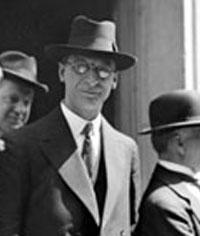Eamon De Valera

It was to establish that claim (the right to Irish Independence) that the Easter Uprising took place. Born in New York City in 1882, Eamon De Valera Immigrated to Ireland as a child and as a young man became active in the Irish independence movement. Joining other nationalists who advocated force as a means of winning independence for Ireland, he participated in the Easter Uprising against British rule. The rebellion, which began in Dublin on Easter Sunday, April 24, 1916, was brutally crushed by the British authorities. De Valera was saved from execution because of his American citizenship, and in 1917 he was released under a general amnesty. The same year, he became leader of Sinn Fein, a political party dedicated to achieving a unified and independent Ireland. In 1919, Sinn Fein achieved an electoral majority in Ireland and De Valera was imprisoned, but he escaped and returned to the United States. During his exile, he was elected president of Ireland by the Dail Eireann, a revolutionary parliament that proclaimed Irish independence. When he returned to Ireland in 1920, Sinn Fein and the Irish volunteers were engaged in a widespread guerrilla campaign against British forces. The same year, a cease-fire was declared, and in 1922, Arthur Griffith and other former Sinn Fein leaders broke with De Valera in signing a treaty with Britain, calling for the partition of Ireland, with the south becoming autonomous and the six northern counties of the island remaining part of Great Britain. De Valera deplored the period of civil war that followed but maintained his opposition to the British government. In 1926, he left Sinn Fein, which had become the unofficial political wing of the underground movement for Northern independence, and entered Irish Free State politics. He formed the Fianna Fail political party and in 1932 was elected Irish president as the party gained control of the Irish Free State government. For the next sixteen years, President De Valera pursued a policy of complete political separation from Great Britain, including the introduction of a new constitution declaring Ireland a fully sovereign state and a policy of neutrality during World War II. In 1948, he narrowly lost a reelection vote and was forced to resign, but in 1951, he returned as Irish prime minister and, in 1959, as president. On June 24, 1973, De Valera, then the world's oldest statesman, retired from Irish politics at the age of ninety. He passed away two years later.

0 Comments:
Post a Comment
<< Home